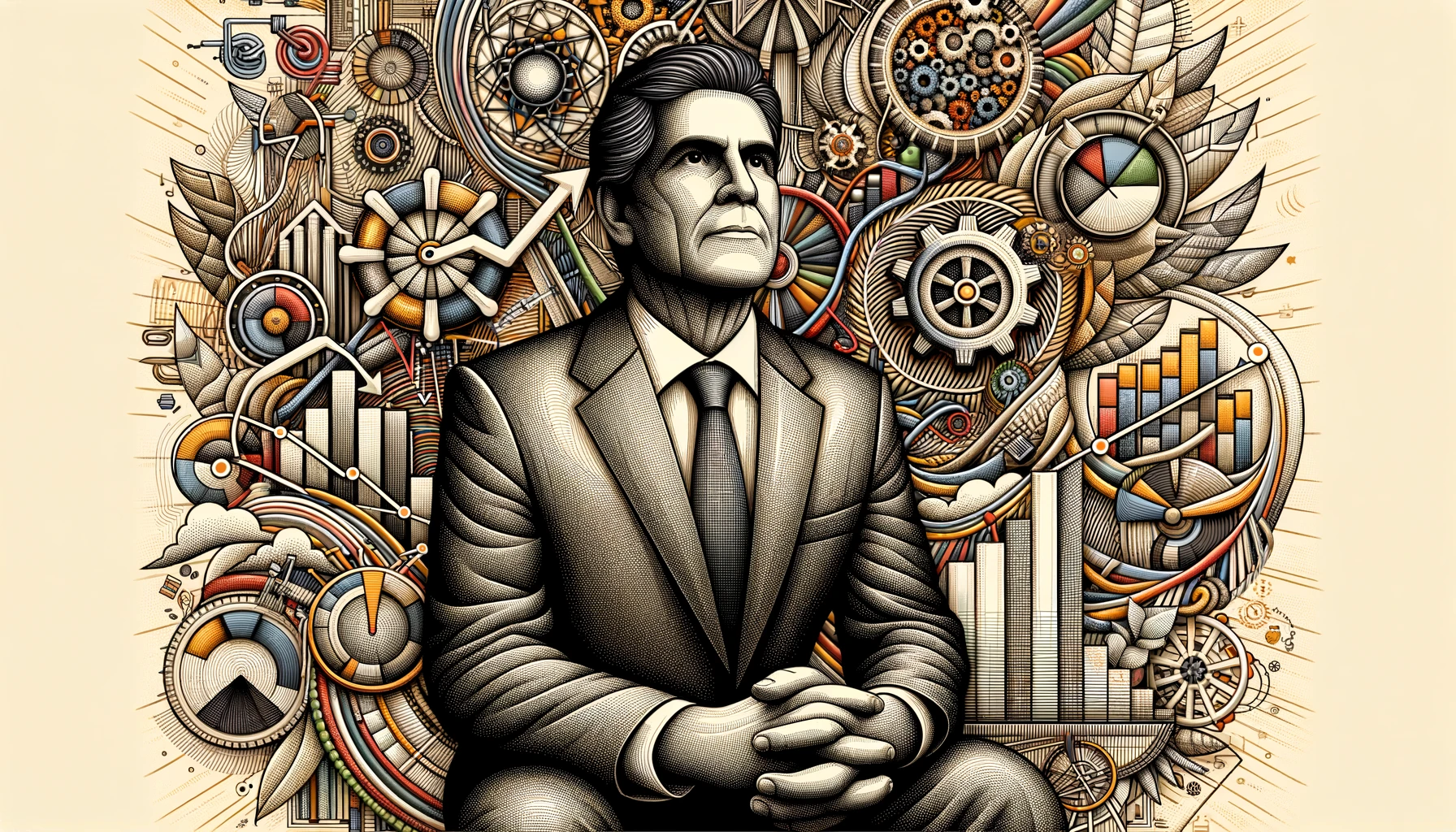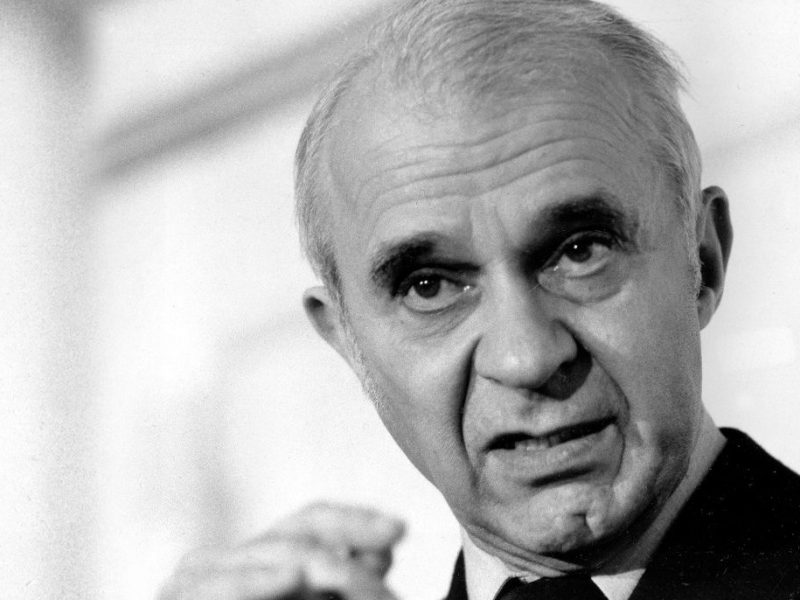In the vast expanse of thinkers who’ve dabbled in the complex dance of numbers and societal growth, there stands a silhouette that’s carved a niche of its own. This figure, often whispered in corridors as Celso Furtado, is akin to a maestro orchestrating an economic symphony.
Hailing from Brazil’s vibrant tapestry, Furtado wasn’t just another academic in an ivory tower. He was a witness to the ebb and flow of economic tides, understanding the nuances of a nation yearning to find its place under the sun. This intimate dance with ground realities, paired with an unyielding drive to comprehend deeper truths, catapulted him to the zenith of developmental economics.
Yet, Furtado’s true genius lay not in crunching cold hard data. It shimmered in his ability to narrate tales, to breathe life into statistics. He professed that economic landscapes weren’t mere pie charts and graphs; they were a cacophony of human aspirations, dreams, and at times, silent sighs.
His illustrious journey in the realm of economics was punctuated with a clarion call for balanced growth. He fervently postulated frameworks that didn’t just chase numbers but ensured the bounty of growth was a shared feast, touching even the most secluded corners. His penned thoughts became a beacon for many, nudging them to perceive economics not just as numbers, but as narratives intertwined with human essence.
Reflecting upon the tapestry that Celso Furtado wove, it becomes palpable that his contributions transcended academic journals. They were a mosaic of wisdom, life experiences, and an unwavering belief that the pulse of economics should resonate with the heartbeat of humanity. His vision, painted with hues of empathy and practicality, continues to beckon many, inspiring visions of an economic realm where prosperity and compassion coalesce.
The Rhythms of Progress: Furtado’s Economic Dance
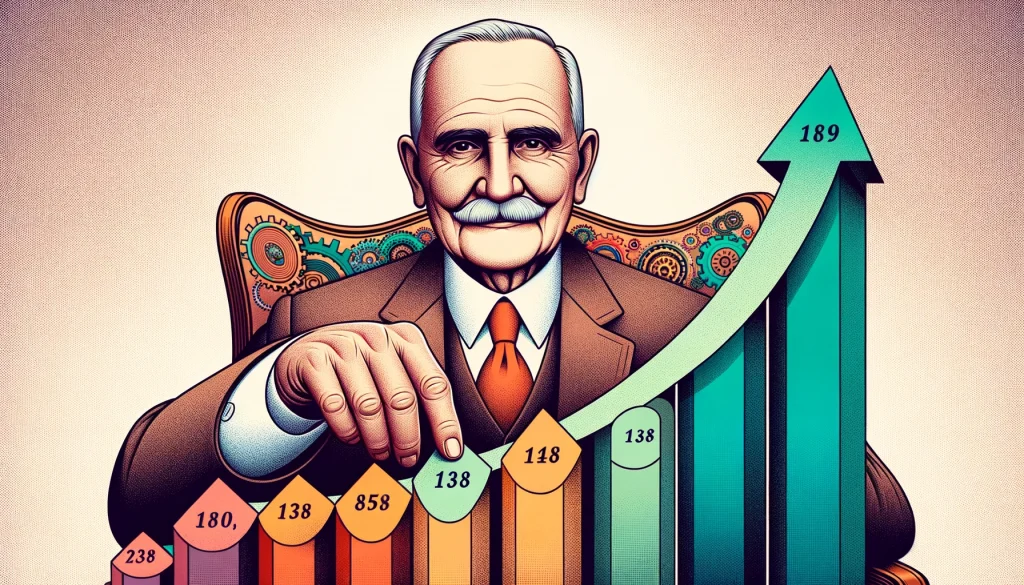
The journey of Furtado wasn’t a mere academic pursuit. He felt the heartbeat of the Brazilian lands, understanding its economic pulse and its aspirations. This connection to his homeland was a driving force, propelling him to dissect and understand the challenges that emerging economies faced.
But it wasn’t just about the numbers for Furtado. It was about the stories those numbers told. For him, Developmental Economics wasn’t a dry subject filled with data. It was alive, teeming with tales of human dreams, struggles, and hopes. He believed that for an economy to thrive, it had to resonate with the people it served.
His dance with economics led him to the concept of economic structuralism. He postulated that there were inherent structural challenges in economies that could hinder their development. These structures, often deeply ingrained, needed to be understood and addressed for genuine progress to occur.
Furtado’s musings on dependency theory further emphasized this belief. He felt that global economic systems were skewed, often benefiting the wealthy nations while leaving the developing ones in the lurch. This imbalance, he felt, was a significant roadblock to genuine development.
His influence wasn’t just limited to theories. Furtado’s stint as Brazil’s Minister of Planning saw him implement policies that echoed his beliefs. He championed equitable development, ensuring that the fruits of growth reached every corner of the nation, touching every individual.
As we delve deeper into his contributions, we come across his significant work with ECLAC (Economic Commission for Latin America and the Caribbean). Here, his influence wasn’t just limited to Brazil. He became a voice for all of Latin America, pushing for policies that emphasized balanced growth and development.
Furtado’s legacy in Developmental Economics is a testament to his belief in a holistic approach. It wasn’t just about fiscal policies or GDP growth rates. It was about ensuring that economic policies resonated with the very soul of the people they affected.
His dance with economics may have ended, but the music he created continues to inspire. Furtado’s steps, filled with passion, empathy, and profound understanding, will continue to guide generations of economists and policymakers, urging them to dance to a different, more humane beat.
Navigating Furtado’s Structuralist Labyrinth

Emerging from Brazil’s vibrant backdrop, Furtado’s odyssey wasn’t just confined within the walls of academia. He felt the rhythms of Brazil, experiencing its economic highs and lows, its aspirations, and its struggles. This intricate dance with reality propelled him to fathom the deeper intricacies of Economic Structuralism.
But Furtado’s tryst with numbers had a twist. It wasn’t just about cold, hard data. For him, it was the tales these numbers spun. The world of Economic Structuralism wasn’t a static canvas of graphs and pie charts. It was dynamic, pulsating with human stories, dreams, and aspirations.
Delving into this realm, Furtado introduced the world to the concept of economic structures. These were inherent challenges within economies that could act as potential roadblocks to genuine progress. These structures, deeply embedded, needed an understanding and a strategy to navigate for any meaningful development to occur.
His musings led him further into the heart of dependency theory. He believed that the global economic framework often favored the affluent nations, often sidelining the developing counterparts. This skewed balance was a major impediment to true progress, he opined.
Yet, his influence wasn’t just theoretical. Furtado, during his tenure as Brazil’s Planning Head, infused these beliefs into actionable policies. He dreamt of equitable development – a vision where growth wasn’t just about numbers but ensuring its benefits permeated every layer of society.
His contributions to ECLAC (Economic Commission for Latin America and the Caribbean) further amplified his thoughts. Here, he wasn’t just Brazil’s voice but a voice for the entire Latin American diaspora. He championed balanced development strategies, ensuring every nation in the region had its moment in the sun.
As we meander through the labyrinth of Celso Furtado‘s thoughts on Economic Structuralism, it’s evident that his legacy isn’t just about theories or policies. It’s about a vision where economics is not just a study of wealth but a study of human aspirations, dreams, and a brighter future.
Strategic Threads of Prosperity: Furtado’s Economic Blueprint
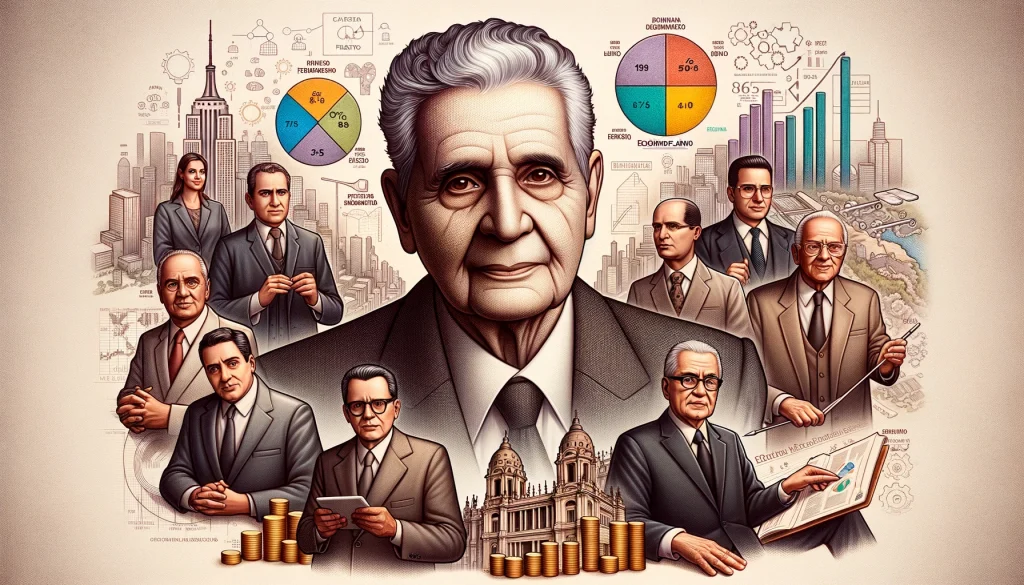
Economics isn’t just about numbers. At least, that’s not how Celso Furtado saw it. For him, economics was an intricate dance of aspirations, challenges, and solutions. Born amidst the vibrant hues of Brazil, Furtado’s connection with the rhythm of his homeland propelled him to explore the intricacies of Economic Planning.
His perspective was unique. He didn’t view Economic Planning as just a series of policies or strategies. Instead, he saw it as a map—a guide that would navigate nations through the complex maze of development, ensuring growth and prosperity for all.
Economic Planning, according to Furtado, wasn’t a standalone process. It was interwoven with the very fabric of society, influenced by cultural nuances, social dynamics, and historical contexts. Recognizing this, Furtado emphasized the importance of creating strategies tailored to the unique challenges and opportunities of individual regions.
One could argue that Furtado’s most significant contribution to Economic Planning was his ability to merge the theoretical with the practical. He wasn’t just an economist tucked away in an academic ivory tower. He was a planner, a strategist, and, most importantly, a doer.
During his tenure as Brazil’s Minister of Planning, Furtado transformed his theories into actionable policies. He championed the concept of equitable development. For him, economic growth wasn’t just about increasing the GDP or enhancing trade. It was about ensuring that the benefits of growth permeated every stratum of society.
His influence wasn’t limited to Brazil. As a key figure in ECLAC (Economic Commission for Latin America and the Caribbean), Furtado shared his insights on Economic Planning with a broader audience. He believed in a collaborative approach, emphasizing the importance of regional cooperation and shared strategies.
In the end, Furtado’s legacy in Economic Planning isn’t just about the policies he implemented or the theories he proposed. It’s about his vision—a vision of a world where economic strategies resonate with the aspirations of the people, ensuring a brighter future for all.
Furtado’s Visionary Blueprint: The SUDENE Odyssey
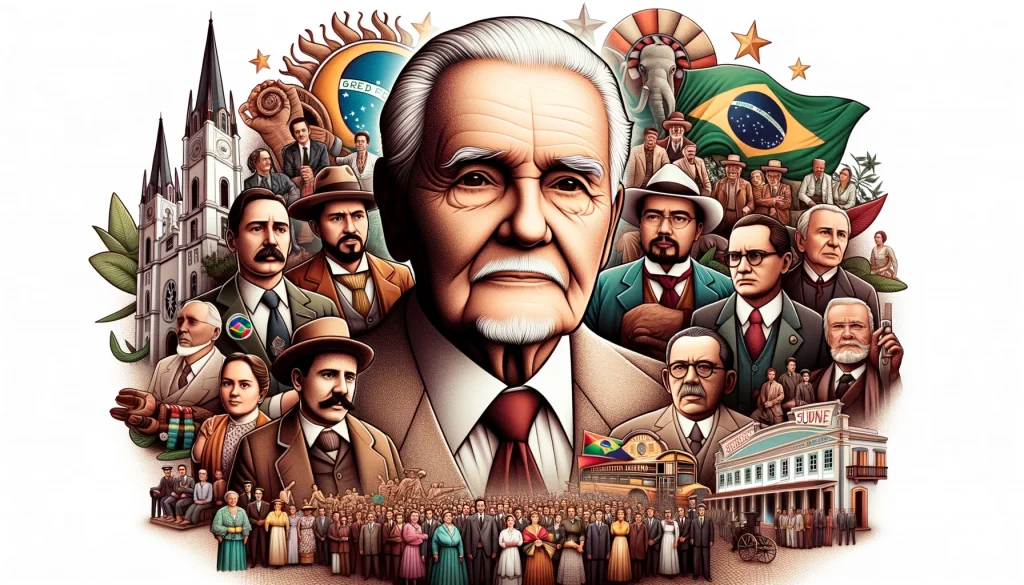
The Northeast of Brazil, characterized by its arid climate and historical challenges, was a region that needed a bespoke approach to development. Enter SUDENE, an agency conceptualized to address the unique challenges faced by this region. And at the heart of this initiative was Celso Furtado, whose vision for the Northeast was both ambitious and compassionate.
Furtado understood that the region’s development couldn’t be viewed through a generic lens. The Northeast had its unique challenges – from climatic adversities to historical socioeconomic disparities. SUDENE was conceptualized to offer tailor-made solutions, ensuring the region’s growth was both sustainable and inclusive.
But what set SUDENE apart was its holistic approach. Under Furtado’s guidance, it wasn’t just about infrastructural development. It encompassed a myriad of facets – from agrarian reform to educational initiatives, from industrial growth to cultural preservation. Furtado believed that for true development to occur, every aspect of society needed to be addressed.
SUDENE‘s strategies were innovative. Instead of relying solely on traditional economic models, Furtado championed the idea of integrating local knowledge and resources. He believed in harnessing the potential of the Northeast, tapping into its rich cultural heritage and indigenous wisdom.
One of the cornerstones of SUDENE‘s approach was its focus on agrarian reform. Furtado recognized that the majority of the Northeast’s population was dependent on agriculture. By introducing reforms that ensured equitable land distribution and promoting sustainable farming practices, SUDENE aimed to transform the region’s agricultural landscape.
But Furtado‘s vision wasn’t limited to the economic realm. He believed in the power of education and cultural initiatives to drive change. Under SUDENE, numerous educational programs were launched, aimed at equipping the Northeast’s youth with the skills needed for the future.
Celso Furtado and the Evolution of Developmental Thought

Wandering through the labyrinth of economic philosophies, one can’t help but be captivated by the wisdom bestowed by Celso Furtado. His magnum opus, endearingly dubbed Developmentalism, illuminates the majestic odyssey of nations as they chart their fiscal destinies. This isn’t a mere tale of data points; it’s an enthralling ballet of socio-economic dynamics, vividly narrating the financial metamorphosis of countries.
Picture a world where the prosperity of nations isn’t just a tally of GDP or trade figures. Developmentalism beckons us to peer beneath the surface, to feel the pulse of a nation’s people, to embrace its natural treasures, and to resonate with its dreams. Furtado wasn’t merely crunching numbers; he was a dreamer, recognizing that genuine advancement transcends mere ledgers.
Venturing into Developmentalism invariably leads one to the intricate dance of autonomy and reliance. Furtado unveiled a reality that countless budding economies confront – the looming presence of their advanced counterparts shaping their fiscal decisions. It’s reminiscent of a young sapling yearning to touch the sky, yet restrained by unseen anchors.
Yet, the narrative isn’t solely about hurdles and overcasts. Furtado’s teachings shimmer with optimism about the untapped treasures lying within a nation’s own terrain. He ardently propagated the notion of fortifying domestic markets. Envision it as tending to one’s own lush garden, cherishing its blooms, rather than longing for fruits beyond the fence. This home-focused approach not only heralds lasting growth but also kindles a spirit of independence and tenacity.
Pausing to reflect, one must admire Furtado’s fervor for industrial prowess. But, here lies the magic – it wasn’t about haphazardly dotting the landscape with factories. Furtado dreamt of judicious industrial growth, meticulously crafted, considering a nation’s distinct ethos and bounty.
To sum it up, exploring Celso Furtado’s Developmentalism feels like setting sail on a voyage of discovery, unearthing a treasure trove of insights into the realm of economic blossoming. From navigating the tempests of external ties to basking in the glow of home-grown prosperity, Furtado’s sagacity remains a beacon for nations aspiring for authentic fiscal liberation.
Furtado’s Tapestry of Distinguished Laurels
Wandering through the vast corridors of economic tales, Celso Furtado sparkles as a beacon of wisdom. His contributions weren’t merely confined to theoretical musings; they were about weaving narratives, molding directions, and envisioning a radiant fiscal horizon for nations. The global community sat up and applauded.
Each accolade gracing Furtado’s illustrious career echoed his insatiable thirst for knowledge and his steadfast devotion to economic betterment. These honors weren’t mere metallic tokens; they voiced the world’s heartfelt gratitude to a maestro whose vision redefined countless national economic landscapes.
Among the glittering array of recognitions, the Premio Juca Pato holds a special place. Far from being a mere emblem or a piece of paper, it celebrated Furtado’s unparalleled knack for marrying cerebral insights with actionable blueprints. Furtado wasn’t content with ideation alone; he set wheels in motion, ignited minds, and reshaped landscapes.
And the saga of appreciation didn’t end there. The Raul Prebisch Lecture, eloquently delivered by Furtado, transcended a conventional talk. It became a symphony of economic reflections, a magnum opus that budding economists would cherish, ponder, and adapt in myriad ways. His articulations during this discourse weren’t just phrases; they were nuggets of profound sagacity.
The economic realm is a vast, convoluted expanse, laden with complexities. Nonetheless, Furtado’s monumental inputs were too stellar to be overshadowed. Kudos and commendations, from academic halls to international economic conclaves, flowed in incessantly. Each resonating with a different shade of his brilliance, each acknowledging his indomitable imprint on global economic narratives.
To wrap it up, while shimmering trophies and plaudits paint a part of the picture, the true essence of Furtado’s legacy is etched in the economies he sculpted, the policies he pioneered, and the legion of scholars he kindled. His journey might span a lifetime, but his legacy is timeless, touching souls across generations.
Conclusion
Celso Furtado remains an intellectual giant when we talk about development economics and Latin American economic history. Born in the vibrant heart of Brazil, he didn’t just observe the economic disparities around him; he delved deep into understanding their root causes. His insights into underdevelopment and economic structures have provided a roadmap for many policymakers. His works, like “Economic Development of Latin America”, have become staple readings in economic curriculums worldwide.
His belief was simple yet profound: economies don’t operate in isolation. They’re deeply intertwined with historical, social, and political fabrics. And to truly understand an economy, especially in a Latin American context, one must consider these factors. This perspective, often referred to as structuralism, has shaped countless research studies and policy decisions.
In our rapidly changing world, the teachings of Celso Furtado still resonate. They remind us that while numbers and data are essential, the human story behind those numbers is equally significant. His legacy, therefore, isn’t just in the books he wrote or the theories he propounded. It’s in the generations of economists, policymakers, and thinkers he continues to inspire.
References:
- “The Economic Growth of Brazil: A Survey from Colonial to Modern Times”
- “Formation of Contemporary Brazil”
- “Dynamics of Global Crisis”
- “Economic Development of Latin America: A Survey from Colonial Times to the Cuban Revolution”
- “Brazilian Economy: A Contribution to the Analysis of its Development”
- “Global Capitalism in Disarray”
- “Economic Reconstruction of Brazil”
- “The Myth of Development: Non-Viable Economies and National Survival in the 21st Century”
